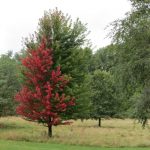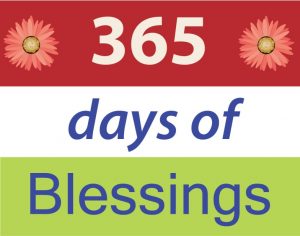 We arrived at church for Mass too early. Rather than finding another church, we decided to sit at one of the church’s picnic tables and talk about our spiritual lives. As we talked about finding God in little events, a hawk came to rest on a nearby fence, his presence proving the point. Perhaps as parishioners started to arrive, they may have wondered what we were doing. A picnic that early in the morning? No food or tablecloth? What they couldn’t see was an opportunity to find God anywhere, anytime.
We arrived at church for Mass too early. Rather than finding another church, we decided to sit at one of the church’s picnic tables and talk about our spiritual lives. As we talked about finding God in little events, a hawk came to rest on a nearby fence, his presence proving the point. Perhaps as parishioners started to arrive, they may have wondered what we were doing. A picnic that early in the morning? No food or tablecloth? What they couldn’t see was an opportunity to find God anywhere, anytime.
When you have odd moments or times of waiting, do you give that time to God?
 Today is the first day of autumn, and I notice quite a mix of color: green and yellow soybean fields, red and green tree leaves, tan fields of dry corn next to green lawns. The change of seasons doesn’t come with one big “Aha!” moment, although sometimes our breath is taken away in a moment of Nature’s beauty. Rather the transition comes leaf by leaf, cooler weather degree by degree, another flock flying south.
Today is the first day of autumn, and I notice quite a mix of color: green and yellow soybean fields, red and green tree leaves, tan fields of dry corn next to green lawns. The change of seasons doesn’t come with one big “Aha!” moment, although sometimes our breath is taken away in a moment of Nature’s beauty. Rather the transition comes leaf by leaf, cooler weather degree by degree, another flock flying south.
In our own lives it’s the same. Unless our lives read like Guideposts, we probably have no miracle moment. We have only moment by moment by moment choices and actions. Life is a process figuring out what is the best thing to do now. We take a step toward personal improvement. We resolve to pray more. We sacrifice a little something. We decide upon a good deed. There’s tremendous power in these little pieces that build upon each other.
Junk mail claims “You’re a winner!” until you read the catch that costs. The gospels also have a catch: “Find life! (But first deny yourself, take up your cross, and let go of life).”
 In Jesus we see in human terms what it means to be God. The gospels are the story of One who came into the world (Incarnation) and loses everything (crucifixion). So where is God found? With those who lose.
In Jesus we see in human terms what it means to be God. The gospels are the story of One who came into the world (Incarnation) and loses everything (crucifixion). So where is God found? With those who lose.
Amid flash floods, earthquakes, riots, and war, people ask “Where is God?” Christians proclaim: God is on the cross. God suffers with us. God does not will or permit suffering. God’s will is simple: God wills love—all the time, and that is all. “So suffering is not an obstacle to the presence of God, suffering is one manifestation of the presence of God” (Michael J. Himes, Doing the Truth in Love).
Himes continues: “The cross is not something that happens to Jesus, it is what Jesus has been aiming at all along.” Jesus predicts the cross all the way: the one who holds onto life loses it; the one who gives life away sees it become everlasting life.
Do I want to give myself away? I am made in the image and likeness of God who is pure self-gift. When I’m pure gift, I’m truly who I really am. If I hold on to my life, I will not have any life. But when I give my life away, it becomes everlasting life, and I’m a winner.
The wind of God, the Holy Spirit, continues to sweep over the face of the earth. After billions of years God’s creativity is as vibrant as ever. God just can’t stop! Day by day our world is becoming more and more “charged with the grandeur of God” (Gerard Manley Hopkins). The grandeur  of a mountain range, a supermoon, a monarch butterfly leaves us breathless. Yet such beauty only hints at the unspeakable awe we would feel if we saw the world replete with God. If our eyes could penetrate rock and fur and skin and bark and mud, we could perhaps see the spiritual potential, the receptivity, of created matter to let God reside within—not in any animistic way like primitive religions’ wood gods—but the expectant potency for the fullness of the Incarnation when all plants and animals and humans and galaxies will reach their goal in Christ. That “day” will come “Because the Holy Ghost over the bent/ World broods with warm breast and with ah!/ bright wings” (Gerard Manley Hopkins).
of a mountain range, a supermoon, a monarch butterfly leaves us breathless. Yet such beauty only hints at the unspeakable awe we would feel if we saw the world replete with God. If our eyes could penetrate rock and fur and skin and bark and mud, we could perhaps see the spiritual potential, the receptivity, of created matter to let God reside within—not in any animistic way like primitive religions’ wood gods—but the expectant potency for the fullness of the Incarnation when all plants and animals and humans and galaxies will reach their goal in Christ. That “day” will come “Because the Holy Ghost over the bent/ World broods with warm breast and with ah!/ bright wings” (Gerard Manley Hopkins).
How is God in process of giving the Godself to you? How can you give yourself to God?
As a human being, Jesus Christ was as subject to daily tasks as any of us. In the carpenter shop in Nazareth did Jesus wonder about the punishment of Adam and Eve to work, especially the work that is tedious, thankless, mindless and so repetitive that we wonder why we even bother? (“I’ll need to do it again tomorrow!”)
Day after day we cook meals, wash dishes, make the bed. Season after season we wash windows and weed gardens. How do we respond? With boredom? With creativity? Actually, I appreciate the mindless tasks like cleaning sinks and folding wash and weeding. Though perspiring, I feel holy leisure, an hour without care or planning. Meditative minutes when God seems a little closer. I invite God into these moments. “Dear God, I have time for tea. Won’t you sit down?”
 Today is the anniversary of my promise of fidelity or temporary vows. Great years of community living, productive mission, awesome prayerful moments! Oh yeah–and some terribly catastrophic times. That first promise is truer today than it was years ago. My religious life began in the high drama of youthful romance with my God, and it continues with daily commitment. While anniversaries mark a special day on the calendar, they include 364 other days without which there would be no anniversary. And so today I praise God for the many 364 days I’ve experienced each year and these annual special days. The goodness of God has pervaded each day whether I realized it or not. Now so much for this blog. I need to celebrate this 365th day.
Today is the anniversary of my promise of fidelity or temporary vows. Great years of community living, productive mission, awesome prayerful moments! Oh yeah–and some terribly catastrophic times. That first promise is truer today than it was years ago. My religious life began in the high drama of youthful romance with my God, and it continues with daily commitment. While anniversaries mark a special day on the calendar, they include 364 other days without which there would be no anniversary. And so today I praise God for the many 364 days I’ve experienced each year and these annual special days. The goodness of God has pervaded each day whether I realized it or not. Now so much for this blog. I need to celebrate this 365th day.
Oak Openings’ yellow trail is a study in opposites. Hard ground gives way to sandy soil. Sweet smells turn to brackish odors. Shadows part in a shaft of sunshine raining down like wheat from a hopper. A wooded park is a place to contemplate opposites, those paradoxes that are integral to our Christian faith. Emptiness leads to fullness. Absence leads to presence. Death leads to life.  Earth leads to heaven.
Earth leads to heaven.
Our day is filled with opposite ends of the spectrum; for example, Kathleen Norris writes of liturgy and laundry, both routines that can lead to worship. Maybe for you it’s taking children to soccer practice. Or sorting socks and organizing agendas for an important meeting. Or taking out the trash and bringing in a friend who’s grieving.
Today bless God for the opposites in your life, and see each circumstance as an opportunity to find Christ in the midst of daily occupations. St. Therese of Lisieux herself said that Christ was most abundantly present not in prayer but in the midst of the ordinary daily occupations.
 When I walk around the lake or into the woods, I have a feeling of expectancy. Will I see deer? Will a heron fly across the lake? Will I need to sidestep poison ivy? When on a leisurely stroll or an urgent errand, I am attuned to whatever will be, to whatever I’ll meet. Something is always afoot! Those times make me wonder how much I miss at other times. What did I miss when cooking a meal, talking on the phone, driving to work, or playing a game? What did I miss when praying Morning Prayer or attending Sunday worship? Surely, something sacred is always afoot!
When I walk around the lake or into the woods, I have a feeling of expectancy. Will I see deer? Will a heron fly across the lake? Will I need to sidestep poison ivy? When on a leisurely stroll or an urgent errand, I am attuned to whatever will be, to whatever I’ll meet. Something is always afoot! Those times make me wonder how much I miss at other times. What did I miss when cooking a meal, talking on the phone, driving to work, or playing a game? What did I miss when praying Morning Prayer or attending Sunday worship? Surely, something sacred is always afoot!
O God, give me a sense of expectancy to find you around the corner.
 I picked red raspberries last evening, a good night to do so with wind and few mosquitoes. The secret to getting every berry is to pick carefully going in one direction, then coming down the same row in the opposite direction. The different perspective yields more berries. Paula D’Arcy in her book Seeking with All My Heart tells of the death of family members, victims of a drunk driver. For her the driver was a “symbol of negativity and loss,” “an enemy and a force of ruin.” Then through a powerful experience of forgiveness, she saw that same man as “an agent of love.” Her different perspective yielded a deeper spiritual life. This morning I’m looking from one perspective at the coming day. Cooking meals at Lial Renewal Center, shopping for groceries, playing piano for the parish Mass. At the end of the day I will look back from a different perspective. Will I see feeding the hungry, leading the people in praise of God, and taking care of things that need to be done?
I picked red raspberries last evening, a good night to do so with wind and few mosquitoes. The secret to getting every berry is to pick carefully going in one direction, then coming down the same row in the opposite direction. The different perspective yields more berries. Paula D’Arcy in her book Seeking with All My Heart tells of the death of family members, victims of a drunk driver. For her the driver was a “symbol of negativity and loss,” “an enemy and a force of ruin.” Then through a powerful experience of forgiveness, she saw that same man as “an agent of love.” Her different perspective yielded a deeper spiritual life. This morning I’m looking from one perspective at the coming day. Cooking meals at Lial Renewal Center, shopping for groceries, playing piano for the parish Mass. At the end of the day I will look back from a different perspective. Will I see feeding the hungry, leading the people in praise of God, and taking care of things that need to be done?
Today practice changing perspective. From how many angles can you see a situation? The reality may be closer to the perspective from which God sees.
 Today we celebrate St. Benedict. He reformed the way monks–and we–pray the Liturgy of the Hours (Divine Office). He chose the “Lite Psalter” method of fewer psalms and shorter hours (prayers prayed periodically throughout the day). Before his reform some monks would claim “One for the strong!” meaning they would allow themselves only one hour of sleep, giving 23 hours to prayer. In this way they felt they followed Jesus’ dictum to “pray always.” To stay awake they prayed 150 psalms, the whole Psalter.
Today we celebrate St. Benedict. He reformed the way monks–and we–pray the Liturgy of the Hours (Divine Office). He chose the “Lite Psalter” method of fewer psalms and shorter hours (prayers prayed periodically throughout the day). Before his reform some monks would claim “One for the strong!” meaning they would allow themselves only one hour of sleep, giving 23 hours to prayer. In this way they felt they followed Jesus’ dictum to “pray always.” To stay awake they prayed 150 psalms, the whole Psalter.
Another interpretation of “pray always” is to punctuate our day with prayer. I’d much rather do that! Today be like Benedict. Pray fewer prayers, but fully engage in prayer. Also try saying a short prayer before beginning the next activity, or use down times like waiting on the computer or emptying the dishwasher as times of prayer.

